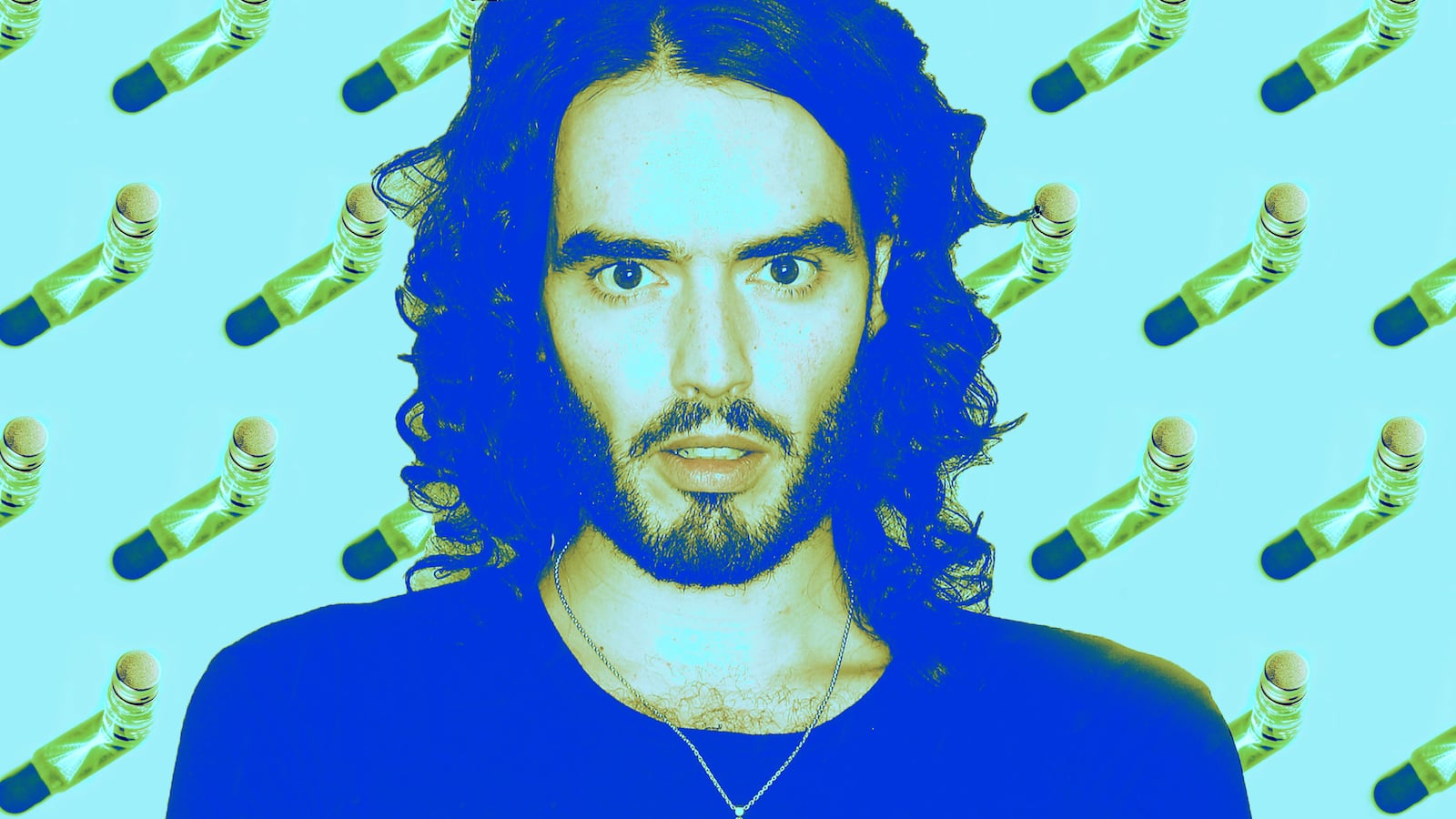If there’s one thing few people had on their 2021 bingo cards, it would be anti-vaxxers becoming enamored with British comedian Russell Brand for his conspiracy theory-laden YouTube channel.
The Forgetting Sarah Marshall actor has always presented himself as a contrarian—a “free-thinker” who isn’t afraid to challenge established views or spout off at the government (both U.K. and U.S.).
But recently, Brand, who always seemed to skew left in his political beliefs, has found a loyal fanbase in right-wing conservatives and anti-vaxxers who have flocked to his YouTube and Facebook accounts, hailing the 46-year-old as a so-called “voice of reason.”
He’s played heavy to this fanbase, interviewing right-wing trolls Ben Shapiro and Candace Owens, although he does disagree with them on certain points. In June, he asked his watchers if he should accept Fox News’ invitation to appear on the network; most agreed he should. “I would suggest Tucker; he’s very fair,” one fan commented.
The titles of his videos are often designed to delight or infuriate, depending on the viewer’s political stance, leaning heavily on incredulous clickbait titles such as: “Thought Biden Couldn’t Sink Any Lower?? THINK AGAIN!!,” “Did Liberals Use Feminism to Justify Afghan Cluster F*ck?,” “SHOCKING Wuhan Evidence: Did Fauci LIE?,” and “So...Trump was RIGHT About Clinton & Russia.”
But for the past few weeks, Brand has also taken issue with the vaccine, casting doubt on the trustworthiness of the FDA, asking if vaccine mandates are an assault on people’s bodily freedoms, calling the vaccine a “gold rush,” and pondering whether people could trust Bill Gates. Most recently, Brand declared that there was a “vaccine apartheid,” going after CNN anchor Don Lemon after he called out people who refused to get vaccinated.
And Brand has struck a viewership goldmine with his videos. His videos, which appear to be monetized, often rack up millions of views across YouTube and Facebook, and his comment sections have become hotbeds of misinformation.
His viewership has railed against Dr. Anthony Fauci, mocked the phrase “follow the science,” talked about microdosing with ivermectin, and claimed loved ones had passed away as a result of getting the vaccine.
“Either he had a complete awakening after I last checked or either I was completely wrong about him,” a user commented on Brand’s video about the alleged untrustworthiness of Facebook putting disclaimers on posts that contain medical misinformation. “I thought he was one of these crazy people who think CNN is real news.”

Russell Brand on his YouTube show
YouTubeOn Wednesday, YouTube announced it planned to crack down on content posted to its platform that spread medical misinformation, saying it had already removed more than 130,000 videos within the past year that violated its COVID-19 vaccine policies. YouTube said of Brand’s channel, “We’re reviewing the videos raised by The Daily Beast.”
Brand’s YouTube channel has long been a haphazard and rambling space where the comedian posted conversation-style videos—picking a controversial hot topic, political or trivial, and rattling off his take for the next 10 minutes, occasionally interviewing a guest about the matter.
While these videos didn’t necessarily flop, Brand only recently found his core viewership when he began discussing COVID-19 and political hot topics after Donald Trump left office.
And for all of Brand’s clickbait titles, his actual videos aren’t as incendiary as their names suggest. He tends to aimlessly circle the topic, repeating the dubious vaccine-skeptic claims of others while offering precious little insight of his own, playing the role of the guy “just asking questions.” For instance, in “Can We REALLY Trust Vaccine Fact-Checkers??!” he simply reads through a dubious report by Russia’s state-controlled news arm RT line by line, going on various tangents. A December 2020 video titled, “Covid Vaccine - Skepticism or Trust?,” released just as the vaccine was rolling out in the U.K., saw Brand airing a series of clips of vaccine skeptics being interviewed on the street, before sharing, “I’m certainly by no means saying ‘Don’t take a vaccine,’ neither am I saying ‘Do take a vaccine’” and railing against an increase in “government authority” and decrease in “personal liberties” that is “concerning.”
In “Vaccine Mandates: An ASSAULT On Your Bodily Freedoms?,” published on Sept. 16, Brand opined, “The idea of mandating something, that’s authoritarianism. That’s what that is. That’s telling people they have to do stuff… I think that it’s pretty significant and serious around this issue, even though I would never tell anybody what they should do with their own body, that’s my personal perspective…” He later falsely claimed that “everyone went along with [the lockdowns] patriotically” during the early stages of the pandemic, and to impose mandates now would violate “the principles of freedom… the very principles that countries like the United States of America were founded on.”
After Joe Rogan admitted he had contracted COVID-19 and was taking ivermectin, which is also used to deworm horses, to treat it, Brand quickly jumped at the chance to lament how the media was “deeply cynical about the method of his treatment.”
“[What] I find interesting is the way that Rogan is being treated by what you’d have to call the mainstream media and their appetite to condemn, and in some ways, with particular bias,” he says, while neglecting to mention that the FDA had warned people against using the drug to treat COVID-19 due to its dangerous side effects.
He then reads off journalist Matt Taibbi’s Substack post about ivermectin and its popularity among those who lean right politically, and says people should recognize that “science is not free from biases, [and] science exists within certain economic and financial constraints with certain economic and financial imperatives.”
“I’m not recommending anyone does anything,” Brand later clarifies, saying he doesn’t want any “aggravation” from YouTube. “I really don’t feel inclined to or qualified to do anything of that nature.”
And in his takedown of Lemon’s appearance on Chris Cuomo’s CNN show, he reads through a New York Times story and recent Kaiser Family Foundation report that breaks down groups that are unvaccinated and their reasons for doing so. He quickly brushes past those who refuse to get the vaccine because of their religious beliefs, reasoning they value their personal liberties and their primary authority is religion-based, rather than taking edicts from the government. Brand then parses the KFF report, pointing out minority groups’ valid concerns about getting the vaccine, such as obtaining childcare so they can get their shot, worries about missing work if they experience side effects, and hesitancy about getting a vaccine that hadn’t been FDA-approved. He fails to mention the extreme rarity of people having severe side effects to the vaccines and then makes a side note that the FDA is untrustworthy even if it did approve Pfizer’s vaccine.
Dr. Sadiya Khan, an epidemiologist and assistant professor of medicine at Northwestern University’s Feinberg School of Medicine, told The Daily Beast that while she would never have any issue with Brand or anyone else asking questions about the vaccine or being hesitant to take it, she says it’s important to get their answers from a trusted source.
“I think it’s really important for everyone to think for themselves,” she says. “I am not frustrated at all by individual-level questions, by individual-level discussion, or making sure that individual concerns are addressed. What’s frustrating is when there is not rational conversation, when there is misinformation, or blatant lies as related to the FDA approval.”
Dr. Rebecca Weintraub, an assistant professor in the Department of Global Health and Social Medicine at Harvard Medical School, agrees. “I think the most important thing is going to the source and looking at the original data for these discussions and decisions.”
“There has been both a mistrust in science and a politicization of this pandemic,” she adds. “We understand why folks are questioning and asking good questions about the vaccine. We are recommending that folks initiate a conversation with a provider they know to speak directly with a provider who’s trained as a clinician.”

Health care workers attend to a patient with Covid-19 as they prepare to turn the 45-year-old unvaccinated patient from his stomach onto his back at the Cardiovascular Intensive Care Unit at Providence Cedars-Sinai Tarzana Medical Center in Tarzana, California, on September 2, 2021.
Apu Gomes/AFP/GettyEven if someone has a distrust of government organizations, both Khan and Weintraub say they should still go to the CDC and FDA websites and review the primary data as part of their information-gathering.
But Weintraub and Khan draw the line at Brand seeming to signal-boost the idea that it’s safe to take medicines such as Ivermectin as an alternative method to treat or stave off COVID-19.
“It’s almost comical that the vaccine side effects are being used as a reason not to proceed with something that is safe, effective, and has been shown to protect one against COVID,” Khan says. “Then use a medicine that has no evidence whatsoever for protection, but can give you headache, dizziness, muscle pain, nausea, or diarrhea to list some side effects.”
“The medicines he’s mentioning do not work for treating COVID-19, there is no data,” Weintraub adds. “There’s no reliable data. I wouldn’t give it to my family member; I wouldn’t give it to a patient. I would not as a physician, I would not give you medicine that does not work to treat COVID-19.”
Weintraub urges people who are hesitant about getting the vaccine to listen to the experts, in the same way you would listen to experts of other industries.
“The example that comes to mind is, when I bring my car in for repair and I ask my mechanic, ‘Are the brakes working?’ And he says, ‘Yes, I tested them, they’re safe, you can drive the car.’ And I get in the car and I drive along, acknowledging the expertise of my mechanic that he’s tested the brakes. There’s times when it’s a rare event and my brakes don’t work. But I’ve relied on the right expertise, not assuming I can become an expert overnight in mechanics.”
Khan acknowledges that in this era of mass information with multiple differing opinions and beliefs, it can be difficult to know who to trust, especially when the information is coming from a high-profile figure.
For a celebrity such as Brand with millions of followers, Weintraub says he has taken on the responsibility of giving accurate info to those looking to him for advice. But she says that experts are more than happy to help out and come on his platform to make sure his followers have the best information available.



